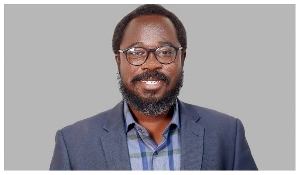 Professor Kobby Mensah, Acting Chief Executive Officer of GTDC
Professor Kobby Mensah, Acting Chief Executive Officer of GTDC
The Acting Chief Executive Officer of the Ghana Tourism Development Company Ltd. (GTDC), Professor Kobby Mensah, has called for an urgent need for Ghana to develop a structured approach to valuing its cultural assets, including cocoa, folklore, festivals, and artefacts.
He argued that while Ghana has long benefited from cocoa’s economic contributions, it lacks a formalized recognition of its cultural and historical significance.
To address this, Prof. Mensah proposed a formula for determining the value of a cocoa bean, which he summarized as STU. In this formula, STU represents the Sum of the Total Use of Cocoa, ny1 denotes the number of years cocoa has been in existence, and ny2 projects the number of years it will continue to exist.
He acknowledged that while the formula requires further scrutiny and refinement, it would provide a quantifiable basis for assessing the significance of cocoa beyond its market price. This, he explained, would help policymakers, investors, and cultural stakeholders make informed decisions about the future of Ghana’s cocoa heritage.
Prof. Kobby Mensah made the call at the launch of the National Chocolate Week, organized by the Ghana Tourism Authority (GTA) in Accra on Friday, 6 February 2025.
He commended the Ministry of Tourism, Culture, and Creative Arts and the Ghana Tourism Authority for their efforts in promoting cocoa as a valuable cultural asset through the Chocolate Week celebration.
Prof. Mensah also lauded the Ministry and GTA’s efforts to ensure the long-term sustainability of cocoa, which remains one of Ghana’s most treasured cultural assets. He emphasized that cocoa is more than just an economic product—it is deeply woven into the cultural and historical fabric of the country.
Outlining GTDC’s strategic vision under his leadership, Prof. Mensah categorized the company’s mandate into four key investment and development areas:
1. Investment in Tourism Physical Infrastructure – Developing world-class tourism sites, facilities, and accommodations to enhance Ghana’s attractiveness as a global tourism destination.
2. Investment in Human Capital – Strengthening capacity-building within the tourism sector to ensure skilled professionals drive growth and service excellence.
3. Investment in Cultural Assets – Promoting and preserving Ghana’s rich cultural heritage, including festivals, folklore, and traditional art forms.
4. Investment in Technology and Innovation – Leveraging digital transformation to enhance tourism experiences and improve service delivery within the sector.
The Chocolate Week initiative was introduced as part of a broader effort to increase local consumption of cocoa products and highlight Ghana’s leadership in the global cocoa industry. Over the years, the initiative has gained traction, incorporating tourism, business, and cultural elements into its celebrations.
By linking tourism with cocoa promotion, the Ghana Tourism Authority and the Ministry of Tourism, Culture, and Creative Arts aim to create new economic opportunities for local businesses, attract investment, and strengthen Ghana’s brand identity on the global stage.
Prof. Mensah’s advocacy for a structured valuation of Ghana’s cultural assets aligns with broader national and global conversations on heritage conservation and sustainable tourism. With Ghana’s tourism sector seeking to diversify beyond traditional attractions, initiatives like Chocolate Week serve as prime examples of how cultural and economic sustainability can go hand in hand.
As Ghana continues to innovate in tourism and cultural preservation, industry leaders and policymakers like Prof. Mensah are calling for strategic approaches to ensure that the country’s heritage assets are not only preserved but also maximized for long-term socio-economic benefits.